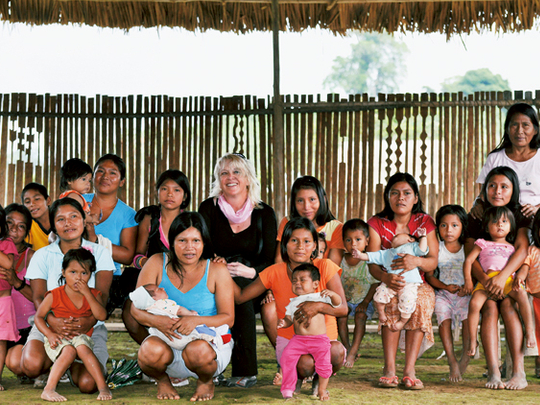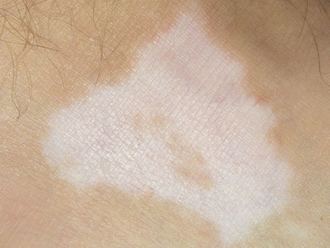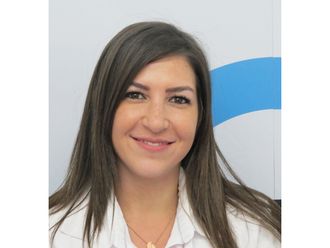
Clasping my hands over my face, I felt a jolt of panic race through my chest. I had foolishly thought I could deal with anything, but nothing on earth could have prepared me for this. It was December 2004, and I had just arrived in the coastal region of Khao Lak in Thailand, which had been practically destroyed by the tsunami.
Looking down on the sweeping bay, I couldn’t seem to focus on anything. The
sight was so ghastly my brain simply could not process it. I saw a surreal concoction of floating trees, upturned cars, bits of houses.
I could see bodies caught up in the debris, washed up on the beach, limbs tangled and trapped in the branches of uprooted trees.
It wasn’t just the sight of destruction that shocked me. It was the smell of decomposing bodies that was all pervasive. My senses were on overload and I felt I was going to faint.
As a nurse, I had encountered death fairly regularly, but this was different. Here it was the scale of death, the sheer enormity of it, that made me want to turn tail and run.
After five years working as an international aid worker, I had never witnessed devastation like this. As soon as I’d heard about the tsunami I’d got on the first plane to Thailand from Uzbekistan where I had been working on a project to help poor people, but now that I was here, every instinct was telling me to run. I was a 40-something English woman, a single pair of hands pitted against a vast, uncharted disaster.
Could I really make a difference here?
“Yes,” I whispered to myself.
For me, the tsunami was yet another reminder of the fragility of life. Like so many other people, it had taken me far too long to learn how to live with real meaning. In spite of the horror surrounding me, I absolutely knew this was where I was meant to be.
Growing up, I had always known it was my destiny to go out into the world and help other people, and I went on to train as a nurse. But somehow life got in the way of all my youthful passion and by the time I reached my late twenties, I found myself divorced with two young children.
As a single mother, I could no longer survive on my salary as a nurse and I reluctantly took a well-paid job as a medical sales representative to keep my family afloat. It was stressful and unsatisfying work and as the years passed, I became increasingly depressed.
Into darkness
At the age of 36, I had my wake-up call. Late one night, I was driving home from a sales conference when I was suddenly plunged into darkness. Terrified, I somehow steered the car to the side of the road, realising that I had gone completely blind.
Sitting there in the darkness with only my thoughts for company, it dawned on me that I had not been living as the person I was born to be, and I promised myself that if I was fortunate enough to get my vision back, I would completely change my life.
Luckily the following morning my sight returned, and my doctor told me that temporary blindness can be caused by extreme stress. I knew I had been given a second chance, and from that moment I completely banished stress and negativity from my life, deciding to focus only on positive things.
With my new can-do attitude, my future became clear. I would do what I had always intended – make a difference. For the next three years, I saved every penny and one day when my 19-year-old daughter Gail, who was at university, and my 18-year-old son Graham, who had just joined the army, came in to the living room I sat them down on the sofa.
“Would you mind if I left home?” I asked. Their delighted faces beamed back at me
as I explained I had got a placement as a volunteer teacher in southern China. I promised I would be there for them if they needed me, but that I would be selling the house and most of my possessions so I would be free to go where life took me.
Not everyone understood my desire to swap my settled middle-class life for a nomadic existence but my family was wonderfully supportive. As soon as I got to China, I knew I was on the right path.
From there, I went to a Tibetan refugee camp in India that was plagued by widespread drug abuse and high youth unemployment. I managed to forge strong links between the camp and several Indian businesses looking for young apprentices.
Next I helped set up a school in rural Nepal. I had quite a few amazing experiences and some frightening ones too. Once I was held at gunpoint by a group of Maoist rebels. and managed to escape when the rebels fell asleep.
I also had the chance to meet the Dalai Lama in September 2002. He wanted to meet me after he learnt that I had spent six months working with Tibetan youth in refugee camps in India. He was keen to find out what I had discovered.
I spent an hour with the Dalai Lama and even brought him some presents – a miniature telescope and a music box that played Singin’ in the Rain.
On the advice of the Dalai Lama, I went to the Himalayas to give local people basic medical training to help reduce the high infant mortality rate.
I moved on to other aid projects, often living without electricity and running water.
I almost lost my life on several occasions. One time while on my way to the mission, the yak I was riding fell into an ice-cold river and I almost drowned. The same day I almost died of hypothermia in a storm. I was saved by a group of nomadic shepherds who found me.
I have also spent time giving basic medical training to women and children in the Amazon rainforests.
Silenced by grief
But it was in Thailand that I was truly tested. For as long as I live, I will never forget that numbed sadness etched across the faces of the orphaned children on the refugee camp where I volunteered. Many were literally muted with grief and I knew if I could do anything at all, it was to find a way to make them to smile again.
I come from a family of magicians and I instinctively felt what the children needed was a little magic in their doom-laden lives. So I arranged for a magician and a travelling circus from England to come to the camp. In no time we were surrounded by jugglers, stilt walkers and fire-eaters. Gradually the children’s faces brightened, but there was less cheer among the adults.
Thais are superstitious people and there was constant talk of supernatural beings and the chance of further waves. When the immediate threat of more disasters passed, they became fearful of the future. After all, most of them had lost their livelihoods and they didn’t know how they were going to feed their families.
It was a difficult situation but one thing I had learned from my past experiences as an aid worker was that hand-ups are so much more effective than hand-outs. I contacted numerous big businesses in Bangkok and asked them to lend their expertise by taking part in a mentorship scheme to advise local people struggling to set up new businesses. The support was overwhelming and the project was a great success. It taught me the value of asking the right people for the right help.
I stayed in Thailand for almost two years but when the earthquake hit Pakistan in 2005, I knew I had to leave, and go to Islamabad. Thousands were dying of thirst and starvation.
At first, I found it difficult, as many people believed foreign aid workers were undercover spies, which meant that just being there made me a target. Once I was going to meet some aid workers for dinner only to hear minutes before I left that the restaurant, a popular haunt for Westerners, had been blown up.
But I didn’t let the dangers put me off, as everywhere I looked people needed help
and I knew my strength was helping people rebuild their lives and their future.
Six months after the earthquake, Cyclone Yemyin tore through the remote north-eastern parts of the country, once again leaving whole communities without food or water. I made the perilous journey to one of the affected villages to see the situation for myself.
I saw starving women and children. It was a desperate scene.
“We have no food to feed our children,” one of the women said.
“I will help you,” I promised, my voice cracking with emotion.
The following day, I went straight to the offices of the World Bank in Islamabad where I showed the director the photos I had taken in that devastated village. He arranged a meeting with the country’s National Disaster Management Authority and with the support of various large companies, which I helped to coordinate, an emergency relief operation was created for the region.
I was so glad I could help these people, but every time I closed my eyes, the image of those desperate, bedraggled village women came back to me. I just prayed the help had reached them in time.
After two years in Pakistan, I felt ready for my next challenge. Since then I have continued to move around the world, turning up wherever I feel I am needed. When I am not on the frontline I work as an international motivational speaker and a personal development coach.
I am now 53, and my humdrum existence in England feels like a lifetime ago. I will never regret the path I have taken as I have been able to create change. These days my life is brimming with passion and purpose.
My next mission is to get more businesses involved in aid work. I launched an initiative called Be The Change: Business Leaders On The Front Line, which gives corporates and entrepreneurs the chance to visit marginalised communities and work with them to use their business skills and creativity to help tackle some of their problems.
It is something I am very excited about because if an ordinary woman like me can
make a difference, just imagine what could be achieved with the brightest business
minds in the world.












